A Constructive Assembly System with Kinetic Memory (Topobo)
Hayes Raffle, Amanda Parkes
This hands-on session, we will briefly discuss the
development of Topobo, a 3D constructive assembly system with kinetic
memory, the ability to record and playback physical motion, and we will
overview our work being done in schools and science museums. Attendees
will get to play with Topobo and begin to explore basic physics
principles of animal locomotion. By snapping together a combination of
Passive (static) and Active (motorized) components, participants can
quickly assemble dynamic biomorphic forms like animals and skeletons
with Topobo, animate those forms by pushing, pulling, and twisting them,
and observe the system repeatedly play back those motions. The same way
people can learn about static structures playing with building blocks,
they can learn about dynamic structures playing with Topobo.
More...
Achieving Wider Use of Innovations in Educational Technology : A Study of Five iCampus Projects
Steve Ehrmann, Steve Gilbert
What policies and practices can lead to
widespread adoption of innovative educational uses of technology? We
studied five outstanding iCampus projects, interviewing over 150 people
and studying project documents, in order to analyze the factors that
encourage, and discourage, institutionalization and widespread adoption
of such innovations. This session will summarize our key findings and
recommendations.
Archiving OpenCourseWare (OCW) Materials to DSpace, the MIT Libraries' Digital Archive System (DSpace)
Ann Wolpert, Mackenzie Smith, William Reilly
The mission of the Libraries to collect,
make available, and preserve the content that forms the scholarly record
is now, in the digital era, being widened to include teaching and
learning materials. One of the premiere expressions of digitized
teaching and learning materials is being created right here at MIT, with
the publication of all course materials via MIT OpenCourseWare (OCW).
Two related goals have been explored and realized by this iCampus
project: 1) establishment of professionally managed curation of teaching
and learning materials (courseware), by the Libraries, over archival
timeframes, and 2) development of standards-based interoperable systems
to enable the wider discovery and re-use of this content. This
presentation describes these two major production systems here on
campus: MIT OCW and the MIT Libraries' digital archive DSpace (an open
source software platform in use worldwide, and developed at MIT). The
newly established interoperation capabilities will be demonstrated, and
we will discuss future applications of the technologies and approaches
to other teaching and learning systems.
More...
Classroom Learning Partner: Increasing Instructor- Student Interaction and Student Learning in Large Classes
Kimberle Koile, Howard Shrobe
In this talk and demonstration, attendees
will play the role of students in a classroom equipped with Tablet PCs
and software called Classroom Learning Partner (CLP). They will submit
anonymous digital ink responses to questions; CLP will interpret and
aggregate the responses, and present the instructor with a histogram of
the aggregation results. Experimental results from classroom studies
aimed at investigating the use of CLP's wireless presentation and
immediate feedback pedagogy will be discussed.
More...
Consortium for Writing Instruction (iMOAT)
Les Perelman, Chris Felknor, Marlene Miner, Irvin Peckham, Deborah Barrett
This session will explore the different ways iMOAT is being
used and will be used in the near future. The third part of the session
will discuss the current creation of a non-profit organization to
ensure that iMOAT continues to be controlled by writing teachers for use
by writing teachers. The final part of the session will explore
iMOAT's immense potential as source of research data. Already thousands
of essays from students who have given informed consent are stored
within the system.
More...
Cross-Media Annotation System (XMAS)
Pete Donaldson, Greg Dancer, Belinda Yung
In this session Prof. Donaldson will give a
brief account of how XMAS grew out of his work building cross media
archives for the study of Shakespeare and using Shakespeare films in
class. XMAS allows students to combine text image and film materials
for use in multimedia essays, presentations and on-line discussions.
Using DVDs as a local video source, XMAS is especially helpful in making
video materials available for analysis, annotation and remote sharing
of insights in any course using film. Examples of student work will be
discussed and there will be an opportunity for audience "hands-on"
participation.
More...
Developing Public Opinion Using Information Technologies (POSIT)
Eric Klopfer, John Durant, Eric Rosenbaum, Britton Boughner
POSIT is a networked augmented reality
role-playing game for Windows Mobile devices. The goal of the game is to
engage players in science controversies. Players move through physical
spaces, gathering evidence from virtual characters and items in
addition to their real surroundings. They develop a position on a
controversial issue and compete for high scores on their arguments as
they debate. In our first (fictional) scenario, players debate whether
MIT should build a BSL-4 biodefense research facility in the middle of
campus. Session attendees will be invited to try out a mini-demo of the
game.
More...
International Genetically Engineered Machine Competitions (iGEM)
Randy Rettberg
iGEM brings the power of design
competitions to undergraduate education in a world-wide event. This
summer, 400 undergraduate students at 37 schools from India, Japan,
Mexico, Columbia, the UK, Europe, and the US designed and built simple
biological systems from standard, interchangeable parts. One example
project from the Edinburgh team was a biological Arsenic detector that
could test wells in the poorest parts of the world for pennies per test.
The undergraduate students learned engineering, biology, and
responsibility in a world-wide scientific competition. See designs for
pattern generation, banana and wintergreen scented bacteria, and many
more.
More...
MIT Online Assessment Tool (iMOAT)
Les Perelman, Roberta Crumrine, Chris Felknor, Louse Goldish, Marlene Miner, Irvin
Peckham, Elisabeth Coughlin, Deborah Barrett, Andreas Karatsolis
This session will begin with a short
overview of the current MIT Online Evaluation System (iMOAT) followed by
a short history of the development of the prototype Online Essay
Evaluation system and the subsequent development of the cooperative
development of iMOAT by a group of writing program administrators
representing a diverse group of universities. The session will conclude
with the participants identifying some of the important lessons learned
in the developing both the system and the community of users.
More...
Natural Interaction: Gesture and Sketch Recognition Interfaces
Randy Davis
Drawings, sketches and diagrams are
essential tools of engineering education and practice, providing a
powerful way to envision, explain, and reason. Yet historically diagrams
have been static, passive pictures, comprehensible only to human
observers. Our work aims to create a whole new "intelligent" design
environment, where people can sketch, gesture and talk about their
design ideas using a computer, but in a way that feels completely
natural. In work to date, we have developed novel sketch interpretation
software that can understand free-hand sketches drawn on tablet PCs,
active whiteboards, and PDAs, then animate them. The result is a sort of
"magic paper" an interactive drawing surface that feels like paper but
is considerably smarter. We will demonstrate its use in a variety of
domains.
More...
Online Learning through Technologically Enhanced Education in Electrical Engineering and Computer Science(XTutor)
Tomas Lozano-Perez, Chris Terman
Online tutor systems are experiments in
developing the textbooks of the future; they provide a combination of
multimedia lecture material and support for interactive problem solving.
We have developed several versions of these systems to support the
delivery of subjects at MIT as well as a number of other universities.
These systems have been used successfully by thousands of students.
XTutor is the most recent of our online tutor systems. Course content is
embodied as a collection of XML documents called XDocs. These are
written using tags that define common problem formats. The tag language
allows users to define new tags and namespaces and provides handlers
that determine processing rules for generating XHTML and for checking
user submissions. We will demonstrate Xtutor as well as its
predecessors.
More...
Remote Online Laboratories (iLab)
Jesus del Alamo, Jud Harward, Steve Lerman
The MIT iLab Project has developed a
software toolkit and middleware to support internet accessible
laboratories ("iLabs") and promote their sharing between schools and
universities. The project focuses on fast lab development, scalable
access for students, efficient management for lab providers while
preserving the autonomy of the faculty actually teaching the students.
The ultimate goal is to establish an economy of shareable labs to
enhance science and engineering education.
More...
RoboCup: The Robotic Futbol Club of Cambridge
Kristina Haller, Jie Tang
The overarching goal of RoboCup is to build
a team of soccer playing robots that will be able to beat the Champion
WorldCup team by the year 2050. This goal pushes for the development of
robust robotic systems with highly developed artificial intelligence.
After every competiton teams must release information about their
systems, allowing other teams to learn from the best, forcing creativity
and rapid development of technology. The MIT Competitive Robotics and
the Harvard College Engineering Society are collaborating and combining
resources to make this happen. During this process, students get hands
on experience outside of the classroom. This talk will discuss our
goals, successes to date, and include several demonstrations.
More...
Spoken Lecture Processing: Advances and Challenges
James Glass
Recorded lecture videos can be tedious to
browse, making it difficult to effectively utilize the information they
contain without expensive and time-consuming pre-processing.
Researchers at MIT are developing speech and language rocessing methods
that will enable content-based search and summarization, enabling
educators and students around the world to more effectively create and
disseminate recorded lecture material. This talk describes recent
research developments in this area and includes demonstrations of
publicly available web-based prototypes.
More...
Technology Enabled Active Learning (TEAL)
John Belcher, Peter Dourmashkin
TEAL is an active learning environment for
large enrollment freshman physics courses (more than 500 students).
Classes are taught in two specially designed classrooms in a highly
collaborative, hands-on environment, with extensive use of desktop
experiments and networked laptops. In this workshop we will try to
give you a feel for a TEAL class, including group experiments using two
of the TEAL desktop experiments (a microwave transmitter and receiver
experiment and an angular momentum experiment).
More...
The Huggable: A Therapeutic Robotic Companion for Relational, Affective Touch
Dan Stiehl
The Huggable is a new type of robotic
companion influenced by research in companion animal therapy and is
being designed for healthcare, education, and social communication
applications. It features a series of novel technologies such as a full
body sensitive skin, an inertial measurement unit, video camera,
microphones, and an embedded PC with 802.11g wireless networking. This
talk will describe the design of the Huggable and outline the ways in
which this robot will be tested in real healthcare facilities in the
coming months.
More...
Visualizing Cultures: Understanding the World Through Visuals of All Kinds
Shigeru Miyagawa
There is a fundamental shift occurring in
the way people learn, from strictly text based to being informed as much
through visuals. MIT's Visualizing Cultures
(visualizingcultures.mit.edu) has partnered with the Smithsonian, the
Boston MFA, and others to make available on OpenCourseWare highly
valuable images, both still and video. John Dower, a Pulitzer Award
winning historian, brings these images to life through his exposition,
and the VCID application makes it possible for the learners to carry out
federated searches of images across collections at a variety of
museums.
More...
Web-based Wireless Sensors for Education (iDAT)
Ian Hunter, Serg Lafontaine, Andrew Taberner, Brian Hemond, Barbara Hughey
iDAT is an educational initiative for use
in both University science and engineering courses as well as Middle and
High School science courses. We are developing a large set of high
quality, yet low cost, physical variable sensors and generators that are
wireless and contain their own 32 bit micro-controller and rechargeable
battery for use in a wide range of educational settings including
universities, high schools, science museums as well as for personal
(“home education”) use. Over 100 wireless sensors and generators are
being developed to cover all of the major areas of physical sciences,
engineering, psychology and biology. The main purpose of the wireless
sensors and generators is to make it very simple for students to
measure, analyze and then possibly control things of interest.
More...
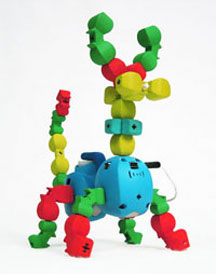
Topobo is a 3D constructive assembly system with kinetic
memory, the ability to record and playback physical motion. By snapping
together a combination of Passive (static) and Active (motorized)
components, people can quickly assemble dynamic biomorphic forms like
animals and skeletons with Topobo, animate those forms by pushing,
pulling, and twisting them, and observe the system repeatedly play back
those motions.

The Classroom Learning Partner (CLP) is being built to
support in-class exercises in a large class, while also enabling
instructors to use the wide variety of exercises possible in small
classes.
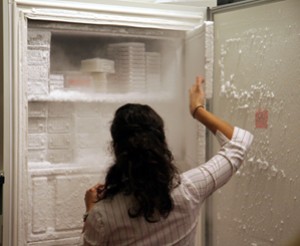
Can simple biological systems be built from standard,
interchangeable parts and operated in living cells? Or, is biology
simply too complicated to be engineered in this way? The iGEM Project
believes in the possibility of engineered biological systems, with the
only way to test such an engineering hypothesis being to try it out.
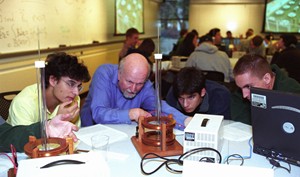
Professor of Physics, John Belcher demostrates a Technology Enabled Active Learning (TEAL)
desktop experiment. Students gather in groups of nine, with twelve groups in a common ares for five hours per week.
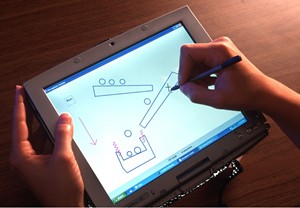
Drawings, sketches, and diagrams of many sorts are ubiquitous
in engineering education and practice, providing a powerful way to
envision, explain, and reason. Yet historically diagrams have been
static, passive pictures, comprehensible only to human observers. We aim
to change that: we want to create a kind of "magic paper " that
understands what is being drawn.
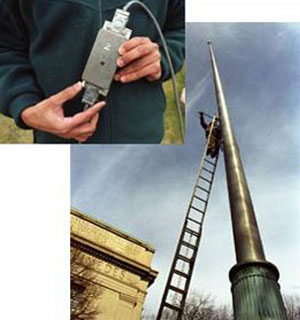
Under the direction of Professor of Civil and Environmental
Engineering Kevin Amaratunga, the MIT flagpole in Killian court is
instrumented with a strain gauge so that it can be monitored over the
Web from anywhere in the world, by means of the iCampus iLabs
architecture (2001).

Through Visualizing Cultures, an OpenCourseWare project about
visualizing events and people in history, we have dealt with tens of
thousands of culturally and historically significant images. The goal is
to teach students to create compelling visual narratives.

The Huggable
combines research currently being done in the Robotic Life Group at the
MIT Media Lab on sensate skins and novel actuators into a portable
robotic platform with the goal of relational, affective touch.

The iDAT projects will develop a large set of high quality.
yet low cost, miniature sensors and actuators that are wireless and
contain their own rechargeable energy source (battery/super capacitor)
for use in a wide range of educational settings including universities,
high schools, science museums as well as for personal (home education)
use.

Developed by
Intelligent Engineering Systems Laboratory, InkBoard is a
network-sharing Tablet PC sketching application. It enables design teams
to interact with each other using real-time ink strokes, and it
supports audio/video conferencing by using ConferenceXP technology.
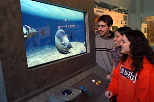
iQuarium is a colorful, interactive aquarium display screen that features swimming fish and a visible flow field in their wake.